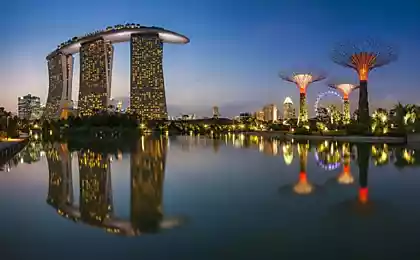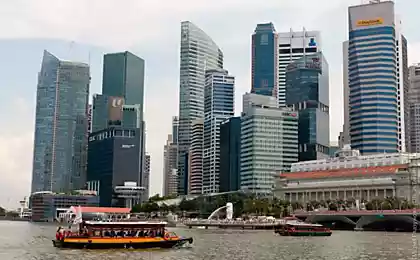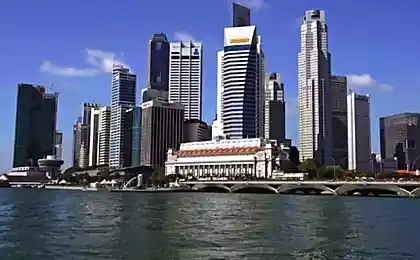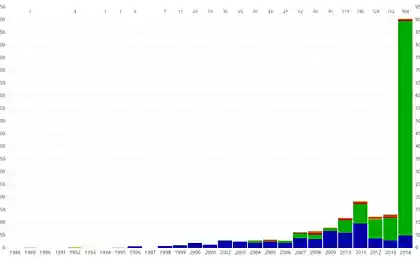768
Why Singapore - the smart city of the planet
The company Juniper Research has studied the impact of information and other high technologies on the lives of people in different cities around the world. After analyzing the impact of urban infrastructure and processes, which involve the inhabitants, the experts were rating the most intelligent human settlements in 2016. The list was headed by Singapore - an island city-state located in Southeast Asia, one of the so-called "Asian tigers". Effective government policies on innovation has won a place for him among the most advanced cities in the world.
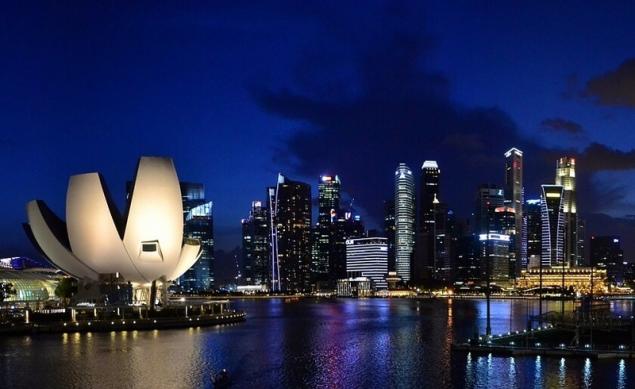
According to the resource IOT Institute, who shared details of the study, it touched many fields, including intelligent lighting system, the proliferation of smart phones, internet access and online services based on open data. Particular attention in its ranking experts have given estimates of transport and energy systems. Among the factors for which Singapore scored high marks, among other things, includes wireless networks, as well as urban traffic control technology.
Smart Nation - «Intelligent Nation»
Many settlements of the world are experimenting with smart city technologies. However, as claimed by the Government of Singapore, his work in this direction, "a much more ambitious and reach a national scale." In 2014, the government launched a program Smart Nation Urban Development. In the framework of the state, business and activists together to develop, implement and improve the high-tech projects to enhance the quality of life for all segments of the population.
Infocomm Investments Pte Ltd Singapore National Accelerator creates a favorable ecosystem for the rapid introduction of innovations in the country. The organization establishes the interaction between the government, startups, individual professionals, corporations and investors. Together they have created solutions - whether services for monitoring of municipal problems, or the collection of medical data - later supplemented by information users. As a result, all participants in the process make a contribution and get tangible benefits.
Penetration of telecommunications
Information and communication technologies play a key role in the concept of an intelligent city. Therefore, the Singapore authorities rapidly develop the Internet of Things, connecting to the network a huge number of cameras and sensors throughout the city. Incoming signals allow them to monitor urban processes. For example, law enforcement authorities may fix emission of debris or smoking in non-designated places. In Singapore, these things strictly.
Circulation of data in the city provides cable internet at a speed of 1 Gbit / s and advanced wireless coverage. Moreover, the Asian operator Singtel earlier this year began offering in Singapore to access the network at speeds up to 10 Gbit / s. This channel should be enough to download a two-hour HD-film for 90 seconds.
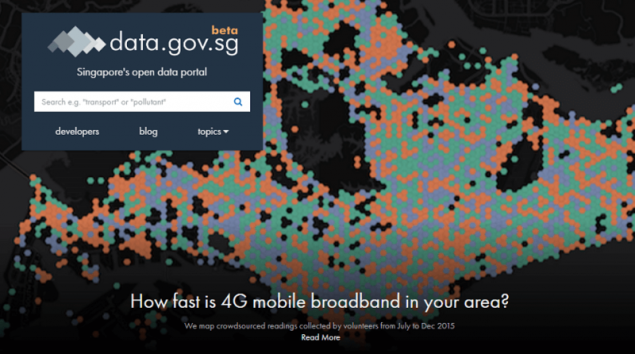
Since 2011, the government publishes a part of the data collected by 70 different agencies, at a special online portal. Once connected to the server, developers can use the information for their projects. To date, the list of applications that are based on open data on Singapore, passed for one hundred units. Thus, the authorities are developing a platform for the realization of new ideas aimed at improving the comprehensive city-state.
Transport system
High population density in Singapore requires enormous efforts to combat the congestion of transport routes. At 5, 4 million people in the city on his way, which occupy 12% of the island area, romp about 1 million cars. The answer to this challenge was the state system of traffic control, using sensors and cloud services. For example, MyTransport app informs users about the schedule of buses, availability and accessibility of taxis. But the project of Beeline, local BlaBlaCar on steroids, sends the public transport on non-standard routes as soon gaining enough requests from citizens. Payment of travel, you can directly from your mobile.
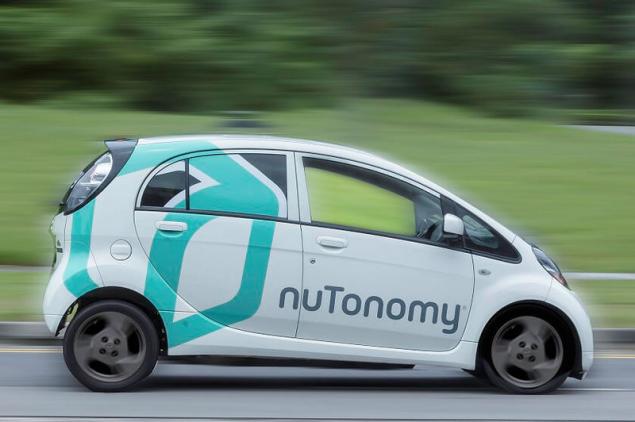
Thousands of robotaksi will soon be driving around the streets of Singapore.
In addition, the Singapore government is interested in unmanned vehicles, to better optimize the traffic. With the support of government agencies nuTonomy startup plans to launch service in Singapore elektrotaksi without drivers. Commercial launch of the project are expected by 2018. Emilio Frazoli, one of the founders nuTonomy, stingy on the technical details. But according to him, the algorithms allow machines to communicate with each other, like a fleet of robots, for effective distribution of the city. It is expected that the technology will reduce the calculation of optimal routes congestion, save drivers to reduce the cost of the fare, and the absence of emissions will improve the environment.
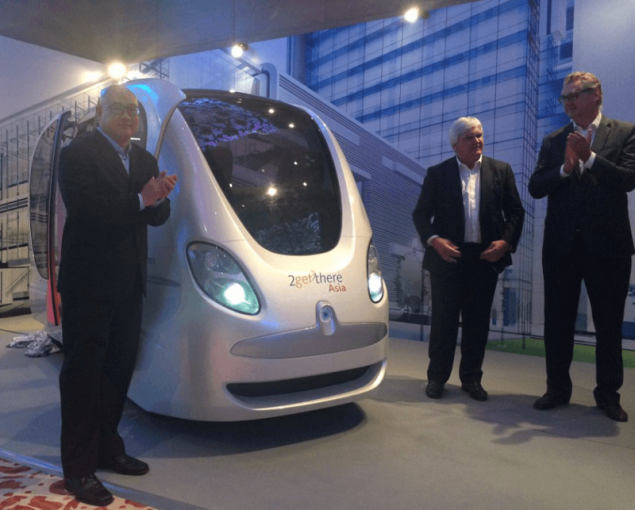
Sample unmanned capsule, designed to Singapore roads.
But judging by the news of another project, unmanned vehicles will be on the streets of Singapore by the end of this year. Above this task work Dutch engineering company 2getthere carrier and Singapore SMRT Services. Thanks to the cooperation of these organizations will be able to residents of the city to move on specially equipped tracks in the self-capsules, accommodating up to 24 people each. Presumably, the system will transport 8,000 passengers per hour in a given direction under any weather conditions.
Resource Management
If you believe the site of Singapore Department of Energy, the city operates an advanced computer control system of electricity. With it, operators remote monitor and control plants for electricity production, as well as the power transmission network. Another clever system provides real-time monitoring of the state of the pipeline. Observers available relevant data on the status of the valves, pressure and other critical metrics. Digital analysis of the dynamics of gas helps services to react quickly in case of accidents.
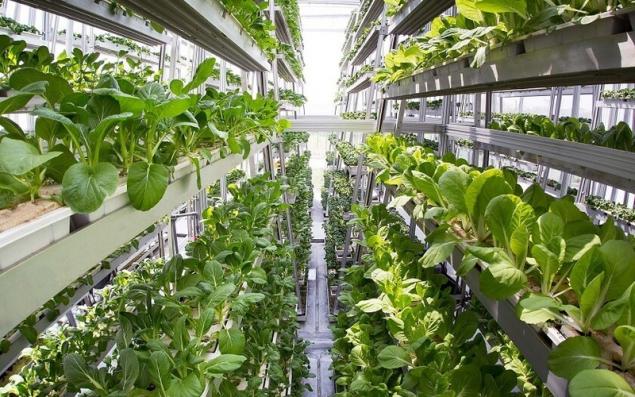
The vertical farm.
The geographical features of the island impose restrictions on the production of plant food and water extraction. But here come to the aid of technology. On the territory of Singapore has four processing plant NEWater wastewater, which satisfy 30% of the total city's water requirements. In the coming decade could reach 55%. And in order to grow more plants in the smallest space, a local company Sky Greens Farm builds modular vertical farm. This design resembles a skyscraper with sliding inside the beds. Rotation modules ensures even distribution of water and sun for the plants at all levels of construction.
Health and Safety Smart Nation Strategy does not deprive the attention and the health system. Several of Singapore hospitals provide telemedicine services in the following format: patients undergoing therapy sessions at home, and doctors monitored their Bioindication using sensors and wireless communication. Appendix MOH iHealth Sg, developed by the Ministry of Health of Singapore, provides background information on the clinics and staff, allowing even watch all through web cams. Another interesting project involves the installation of sensors in the bathrooms of residential buildings, so that citizens can remotely monitor the status of the elderly and sick relatives.
Presentation of 3D-model
Singapore Thousands of sensors and cameras, including helping to maintain public safety. And only one fight against criminal activities permeating the potential of this system is not limited to the city. Singapore authorities in conjunction with software giant Dassault Systèmes developing a digital copy of the city. 3D-model will gather together and take into account the weight of the indicators on demography, energy, climate and other factors that affect the lives of citizens. The government wants to use the program, for example, to predict potential disasters, and working out scenarios to exit them. Part of the data will be open to the public. Launching of the project is scheduled for 2018.
The authorities do not plan to stop there and are going to increase the pace of modernization of the city. But in its current state due to the listed and many other technological projects of Singapore - a vivid example for other cities and governments. Watching his development, we want to believe that more officials will begin to think not just about personal enrichment, but also for the welfare of the people around.

According to the resource IOT Institute, who shared details of the study, it touched many fields, including intelligent lighting system, the proliferation of smart phones, internet access and online services based on open data. Particular attention in its ranking experts have given estimates of transport and energy systems. Among the factors for which Singapore scored high marks, among other things, includes wireless networks, as well as urban traffic control technology.
Smart Nation - «Intelligent Nation»
Many settlements of the world are experimenting with smart city technologies. However, as claimed by the Government of Singapore, his work in this direction, "a much more ambitious and reach a national scale." In 2014, the government launched a program Smart Nation Urban Development. In the framework of the state, business and activists together to develop, implement and improve the high-tech projects to enhance the quality of life for all segments of the population.
Infocomm Investments Pte Ltd Singapore National Accelerator creates a favorable ecosystem for the rapid introduction of innovations in the country. The organization establishes the interaction between the government, startups, individual professionals, corporations and investors. Together they have created solutions - whether services for monitoring of municipal problems, or the collection of medical data - later supplemented by information users. As a result, all participants in the process make a contribution and get tangible benefits.
Penetration of telecommunications
Information and communication technologies play a key role in the concept of an intelligent city. Therefore, the Singapore authorities rapidly develop the Internet of Things, connecting to the network a huge number of cameras and sensors throughout the city. Incoming signals allow them to monitor urban processes. For example, law enforcement authorities may fix emission of debris or smoking in non-designated places. In Singapore, these things strictly.
Circulation of data in the city provides cable internet at a speed of 1 Gbit / s and advanced wireless coverage. Moreover, the Asian operator Singtel earlier this year began offering in Singapore to access the network at speeds up to 10 Gbit / s. This channel should be enough to download a two-hour HD-film for 90 seconds.

Since 2011, the government publishes a part of the data collected by 70 different agencies, at a special online portal. Once connected to the server, developers can use the information for their projects. To date, the list of applications that are based on open data on Singapore, passed for one hundred units. Thus, the authorities are developing a platform for the realization of new ideas aimed at improving the comprehensive city-state.
Transport system
High population density in Singapore requires enormous efforts to combat the congestion of transport routes. At 5, 4 million people in the city on his way, which occupy 12% of the island area, romp about 1 million cars. The answer to this challenge was the state system of traffic control, using sensors and cloud services. For example, MyTransport app informs users about the schedule of buses, availability and accessibility of taxis. But the project of Beeline, local BlaBlaCar on steroids, sends the public transport on non-standard routes as soon gaining enough requests from citizens. Payment of travel, you can directly from your mobile.

Thousands of robotaksi will soon be driving around the streets of Singapore.
In addition, the Singapore government is interested in unmanned vehicles, to better optimize the traffic. With the support of government agencies nuTonomy startup plans to launch service in Singapore elektrotaksi without drivers. Commercial launch of the project are expected by 2018. Emilio Frazoli, one of the founders nuTonomy, stingy on the technical details. But according to him, the algorithms allow machines to communicate with each other, like a fleet of robots, for effective distribution of the city. It is expected that the technology will reduce the calculation of optimal routes congestion, save drivers to reduce the cost of the fare, and the absence of emissions will improve the environment.

Sample unmanned capsule, designed to Singapore roads.
But judging by the news of another project, unmanned vehicles will be on the streets of Singapore by the end of this year. Above this task work Dutch engineering company 2getthere carrier and Singapore SMRT Services. Thanks to the cooperation of these organizations will be able to residents of the city to move on specially equipped tracks in the self-capsules, accommodating up to 24 people each. Presumably, the system will transport 8,000 passengers per hour in a given direction under any weather conditions.
Resource Management
If you believe the site of Singapore Department of Energy, the city operates an advanced computer control system of electricity. With it, operators remote monitor and control plants for electricity production, as well as the power transmission network. Another clever system provides real-time monitoring of the state of the pipeline. Observers available relevant data on the status of the valves, pressure and other critical metrics. Digital analysis of the dynamics of gas helps services to react quickly in case of accidents.

The vertical farm.
The geographical features of the island impose restrictions on the production of plant food and water extraction. But here come to the aid of technology. On the territory of Singapore has four processing plant NEWater wastewater, which satisfy 30% of the total city's water requirements. In the coming decade could reach 55%. And in order to grow more plants in the smallest space, a local company Sky Greens Farm builds modular vertical farm. This design resembles a skyscraper with sliding inside the beds. Rotation modules ensures even distribution of water and sun for the plants at all levels of construction.
Health and Safety Smart Nation Strategy does not deprive the attention and the health system. Several of Singapore hospitals provide telemedicine services in the following format: patients undergoing therapy sessions at home, and doctors monitored their Bioindication using sensors and wireless communication. Appendix MOH iHealth Sg, developed by the Ministry of Health of Singapore, provides background information on the clinics and staff, allowing even watch all through web cams. Another interesting project involves the installation of sensors in the bathrooms of residential buildings, so that citizens can remotely monitor the status of the elderly and sick relatives.
Presentation of 3D-model
Singapore Thousands of sensors and cameras, including helping to maintain public safety. And only one fight against criminal activities permeating the potential of this system is not limited to the city. Singapore authorities in conjunction with software giant Dassault Systèmes developing a digital copy of the city. 3D-model will gather together and take into account the weight of the indicators on demography, energy, climate and other factors that affect the lives of citizens. The government wants to use the program, for example, to predict potential disasters, and working out scenarios to exit them. Part of the data will be open to the public. Launching of the project is scheduled for 2018.
The authorities do not plan to stop there and are going to increase the pace of modernization of the city. But in its current state due to the listed and many other technological projects of Singapore - a vivid example for other cities and governments. Watching his development, we want to believe that more officials will begin to think not just about personal enrichment, but also for the welfare of the people around.



